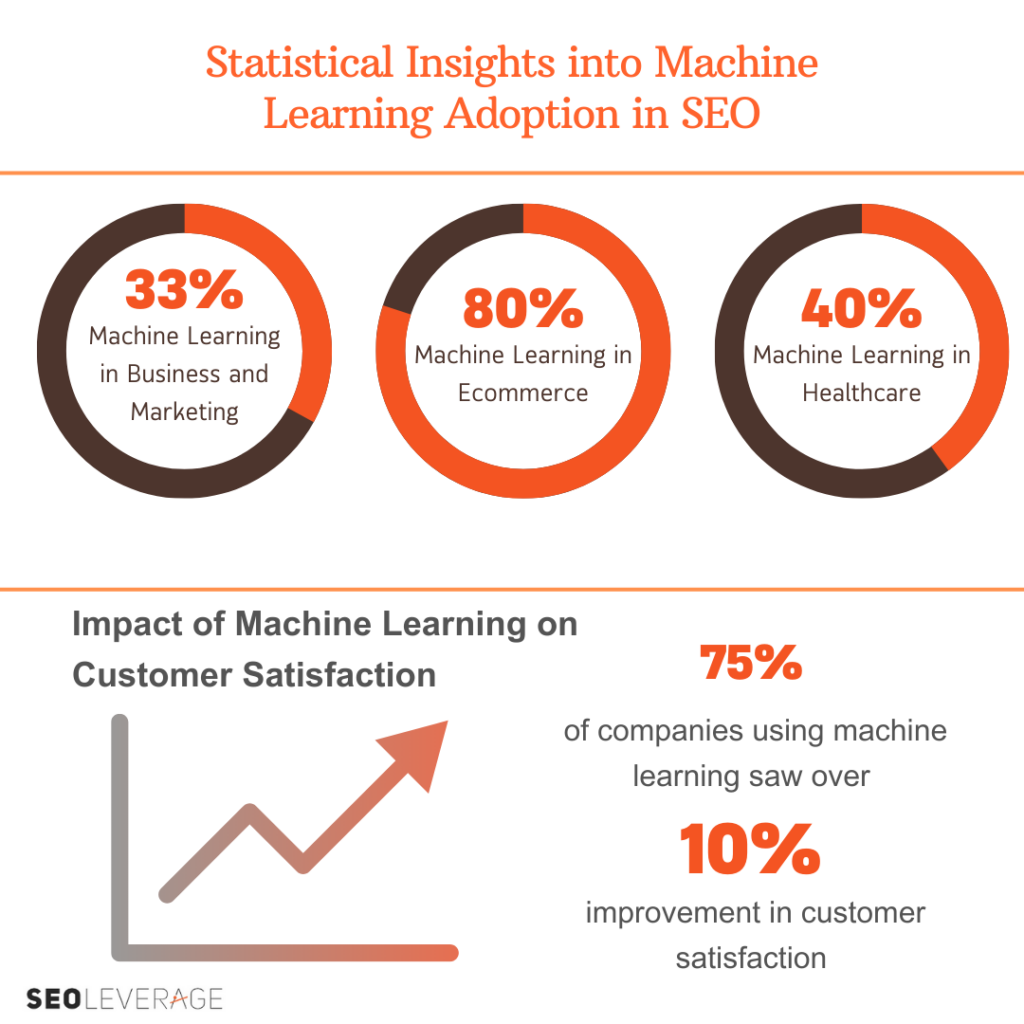Google uses machine learning to refine its search engines. Their learning algorithms regularly monitor user behavior to deliver the most relevant content.
However, more than gathering data is needed these days since marketing is more data-driven than ever. The good news is that ML-powered SEO tools and Google’s continuous upgrades are already available.
Key Takeaways
- The evolution of search engines through machine learning improves search accuracy and user experience.
- Machine learning enhances SEO by analyzing large data sets to improve keyword effectiveness, ranking, and user intent.
- The practical applications of machine learning SEO streamline processes.
Table of Contents
The Importance of Machine Learning in SEO
Within the SEO landscape, machine learning has evolved from a buzzword into a powerful instrument reshaping our optimization strategies. Machine learning enables SEO professionals to:
- Fine-tune their strategies by analyzing large amounts of user data
- Boost website traffic
- Improve keyword effectiveness
- Increase search engine rankings
- Enhance other factors
Gone are the days of keyword stuffing and duplicate content. Today’s search engines are smart, powered by ML algorithms that learn from our every click and query.
To make more great products, Google’s Developers guideline suggested, "Instead of approaching machine learning as if you were a machine learning expert, approach it like the great engineer you are.”
These statistics illustrate the significant impact of machine learning on SEO and business analytics, emphasizing the importance of adapting to these technological advancements in marketing strategies:
- Machine Learning in Business and Marketing: Larger companies often use machine learning for internal applications, like reducing spending, while smaller companies focus on generating customer insights and improving customer experience. The most profitable area for implementing machine learning systems is sales and marketing, significantly aiding in creating personalized strategies. Around 33% of IT leaders use machine learning for business analytics.
- Machine Learning in Ecommerce and Healthcare: Approximately 80% of machine learning companies target ecommerce and retail industries. In healthcare, 40% of newly filed patent applications include an AI or machine learning aspect.
- Impact of Machine Learning on Customer Satisfaction: Around 75% of companies using machine learning and AI have enhanced customer satisfaction by over 10%. This demonstrates the effectiveness of machine learning in understanding and solving customers' problems, leading to improved service and product offerings.
(source)

How to Use Machine Learning in SEO
The SEO landscape is constantly shifting. To stay ahead, understanding cutting-edge trends and strategies is key. One trend that has gained popularity is combining machine learning with SEO.
Machine learning empowers algorithms to learn from data and improve their performance over time.
Here are ways to use machine learning:
1. Optimizing keyword research and selection
Keywords are the building blocks of SEO. But checking through endless lists is a time-consuming, often fruitless way. That’s why machine learning (ML) comes into play to transform the way you discover keywords.
Imagine ditching the spreadsheets and manual analysis for a powerful Artificial Intelligence (AI). ML algorithms can analyze these data:
- Relevant keywords. Get keywords with high search volume with low competition. This is perfectly aligned with your target audience.
- Search trends. Identify emerging search patterns and capitalize on the next big thing.
- User intent. Understand what users are truly looking for, crafting content that resonates and converts.
- Long-tail keywords. These specific phrases hold the key to attracting highly targeted traffic with high conversion potential.
- Competitive edge through intelligence. ML doesn’t just work in your silo, it’s a spy on your competitors. You can identify opportunities and gaps to refine your own approach by analyzing their keyword strategies.
2. Enhancing on-page optimization
Imagine having a team of tiny digital ninjas working around the clock to fine-tune your website for search engines and users alike. That’s exactly what machine learning (ML) algorithms bring to the on-page optimization game.
Here’s how ML transforms your on-page game:
Tuning up your titles and tags
ML algorithms dive deep into your existing content to analyze every detail. They’ll scan your title tags, meta descriptions, and header tags, pinpointing areas where you can boost relevance and clarity.
Think of them as expert proofreaders. They ensure every word is working its hardest to attract those clicks.
Structural savvy for a seamless experience
ML doesn’t stop at words. It takes a view of your website’s structure and layout to identify elements that create friction for users.
- Slow loading speeds?
- Mobile responsiveness issues?
- Need help with navigation?
ML will flag them all to provide actionable insights. This creates a seamless experience that keeps visitors coming back for more.
Embracing the “why” behind the click
ML doesn’t just analyze data; it understands intent. It delves into the “why” behind user search queries to help you create content that aligns with their needs and expectations. This means pages that not only rank well but also engage and convert viewers into clients.
3. Leveraging content creation and optimization
Content is king in the world of SEO. Machine learning algorithms have a role in both content creation and optimization.
Here are ways in which machine learning can be applied:
- Automated content generation. Develop models that generate written content. These include articles, blog posts, or product descriptions, which are based on input data and predefined patterns.
- Personalized content recommendations. Implement recommendation systems that use machine learning to analyze user behavior and preferences. This delivers personalized content suggestions for better user engagement.
- Natural Language Processing (NLP) for SEO. Use NLP algorithms to optimize content for search engines by understanding and incorporating relevant keywords and phrases naturally.
- Image and video optimization. Leverage computer vision algorithms to optimize images and videos for a better user experience.
- A/B testing. Implement A/B testing powered by machine learning to dynamically adjust content elements in real-time for improved user engagement.
- Predictive analytics for trend identification. Apply machine learning models for predictive analytics to identify emerging trends. This allows content creators to stay in line.
- Chatbots for content interaction. Integrate chatbots using natural language understanding to engage with users, answer queries, and provide relevant content recommendations.
- Voice search optimization. Optimize content for voice search by incorporating natural language understanding and processing to align with how people speak.
- Content translation and localization. Utilize machine translation models for content localization. This enables global reach by adapting content to different languages and cultural nuances.
Machine learning models like OpenAI’s GPT-3 and Bard can be used to generate high-quality and contextually relevant text. This can be particularly useful for creating blog posts, articles, and product descriptions.
4. Improving user experience and engagement
The success of SEO relies heavily on user experience. Search engines prioritize websites that deliver a captivating user experience. Machine learning algorithms play a role in analyzing user behavior, including metrics like:
- Click-Through Rate (CTR)
- Conversion rate
- Bounce rate
- Session duration
- User segmentation
- A/B Testing optimization
With a deep understanding, website owners can make data-driven decisions to enhance their website’s navigation, layout, and design.
5. Link-building and off-page SEO
Think of links like votes of confidence for your website. The more you have from high-quality sources, the more trustworthy and authoritative you appear in the eyes of search results.
But let’s be honest: finding those perfect link partners can feel like searching for gold in a haystack. That’s where machine learning (ML) comes in.
ML is like a detective to analyze the web and hidden links. Here’s how it works:
- Quality checkers. Forget wasting time on shady sites. ML algorithms sift through the digital ecosystem to identify websites with high domain authority, relevant content, and strong social signals.
- Competitor checker. ML cracks the code to reveal your competitors’ backlink profiles. You can target similar high-quality websites and craft a targeted outreach strategy.
With ML, link building becomes less of a guessing game and more of a strategy. You’ll discover hidden opportunities, target the right partners, and build genuine connections that boost your website’s authority and visibility.
6. Tracking and analyzing SEO performance
Tracking and analyzing SEO performance is important to measure the effectiveness of your strategies. Machine learning tools can provide advanced analytics and insights that go beyond traditional SEO metrics. What machine learning algorithms can analyze are large data sets, patterns, and predictive analytics.
Furthermore, machine learning algorithms can identify anomalies and abnormalities in SEO performance.
Practical Applications of Machine Learning in SEO
Machine learning is no longer a future concept; it’s already being applied in SEO today. Through innovative tools, machine learning is driving success and streamlining processes in SEO.
The creation of innovative SEO tools leveraging machine learning attests to the immense potential of this technology. One great platform that many use is the SEOLeverage App. From concept to execution, this SEO app is revolutionizing the way you approach SEO.
They offer:
- In-depth analysis of user behavior
- Website traffic analysis
- Important metrics tracking
- Building links
- Actionable insights for optimization with AI tools
- Streamlining the automation of site content auditing and optimization
This search engine optimization tool provides valuable resources for improving SEO strategies. Also, it helps to drive organic traffic to websites.
Frequently Asked Questions
How is machine learning used in SEO?
Machine learning is used in SEO for tasks such as keyword research. This is where it can analyze volumes of data to identify trends and patterns. These also identify relevant and popular keywords for an SEO strategy.
What are the three valuable areas of machine learning to SEO?
These areas can greatly enhance SEO strategies:
- Content creation and optimization
- User behavior analysis
- Predictive analytics for keyword and content performance.
How does voice search optimization work?
Voice search optimization works by adapting content to be more conversational to align with the style used in voice searches and analyzing voice search data to understand user behaviors.
Final Words
Ever feel like you’re crafting a novel when writing SEO briefs? Detailed outlines, endless keyword lists, and the constant pressure to ensure your writer doesn’t miss a beat. But what if there was a way to ditch the time-consuming process?
Machine learning with SEO strategy can have an impact on your task and online visibility. With Machine learning no more:
- Mind-numbing outline creation
- Irrelevant content
- Reworking strategies for ranking content
With the help of machine learning tools and analytics, you can track and analyze your SEO performance. An SEO app like SEOLeverage can also help you to make data-driven decisions.
Remember, at SEOLeverage™️, we combine our App with over 20 years of SEO experience. They help you to optimize your website for Google’s latest standards.
Moreover, our simplified, action-oriented approach ensures that you get a simple-to-follow SEO strategy. Book a call with us today and unlock your website's true potential!

